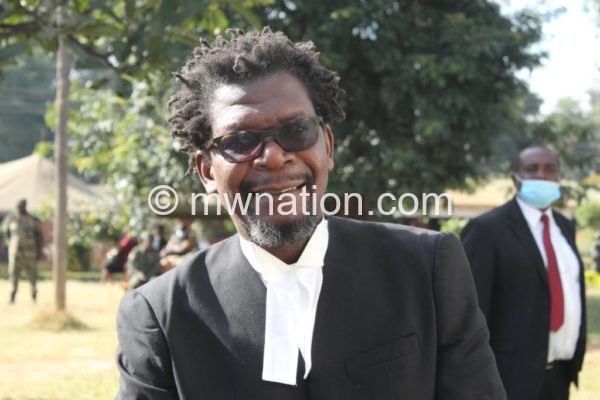Govt to amend Act for new court
Government is set to amend the Court’s Act for establishment of a specialised financial division within the Judiciary to achieve Tonse Alliance administration’s desire to speed up financial crimes.
President Lazarus Chakwera in his maiden State of the Nation Address (Sona) on September 4 2020 said his administration was geared to facilitate the setting of High Court’s financial division to speed up financial crimes.

Attorney General (AG) Chikosa Silungwe in an interview on Thursday said to achieve that dream; the Ministry of Justice and Constitutional Affairs would have to initiate a process to amend the Court’s Act.
The AG said once that is done, they have to look into the issue of human resource and adequate financing of the Judiciary.
“But we’re yet to be approached [and advise on the way forward] as Ministry of Justice and Constitutional Affairs,” the government’s top legal adviser said.
Chakwera told Parliament that consultations were underway to establish the probate and family division, as well as the financial crimes division to fast track the disposal of corruption cases.
But Garton Kamchedzera, a law professor at University of Malawi’s Chancellor College, said just adding a court in the Judiciary does not solve inefficient and ineffective handling and disposal of a criminal case.
“With such an understanding, reforms must be based on rigorous analysis of the criminal justice chain in corruption and other financial crime cases, focusing on various capacities and the efficiency of the criminal procedure employed.
“This is important for evidence-based reforms that can address immediate, underlying, and root causes of the problem as manifested. A mere addition of a division in the Judiciary will not help much if aspects of prevention, investigation, and prosecution are not subjected to reforms, too, in a holistic approach based on the relevant justice chain,” he said.
Kamchedzera said the proposal ignores the need for a “justice chain” approach to law reform in the criminal justice system, and not just an addition of a structure at a prominent point.
“In the criminal justice system, a case does not just involve courts. There are other duty bearers that must investigate and prosecute effectively…the country may have a specialised Judicial division, but that may not effectively address the problem for which we set up such a division,” he said.
The law expert said establishing a new division would require more personnel, but other hitches may not vanish because some may relate to procedural matters, the work ethic in the justice chain, and corruption within the criminal justice system.
Malawi Law Society (MLS) in a response to a questionnaire said it supports the initiative aimed at reforming delivery of justice.
“It is very important. It is like having the general division and a commercial division. It will result in specialisation that would enable specific judicial officers to handle those particular cases. It will also improve jurisprudence on those subjects.
“We are informed more judges will be recruited soon, we are optimistic some will be allocated to this division,” said MLS secretary Martha Kaukonde.
Professor Danwood Chirwa, a dean of law at University of Cape Town in South Africa said the idea of financial division of the High Court is “hugely welcome” and necessary going by the volume of financial crimes.
“The criminal division has too much work, considering that much of the case load in the courts concerns crime. This criminal division lends itself to further subdivision such as into a sexual offences division to deal with this highly specialised area.
“Financial crimes are complex and have become endemic and need specialised adjudicatory skills much as they also need specialised investigative and prosecutorial agencies,” Chirwa said.
He recommend that in addition to a specialised division for financial crimes, there must also be established a special investigative agency for financial crimes (excluding corruption), and a special prosecutorial agency for these financial crimes.
“[Of course] to be effective the new High Court division for financial crimes would require the appointment of additional judges and specialised training for both new and experienced judges,” Chirwa said.
President Chakwera, in his maiden State of the Nation Address delivered in the National Assembly in Lilongwe on September 4, said he was pleased to report of other innovative approaches to justice that the Judiciary has undertaken.
The President said apart from the Malawi Supreme Court of Appeal which sits as a full bench of not less than seven Justices of Appeal, specialised divisions of the High Court have been created and are: Criminal Division, Civil Division, Commercial Division and Revenue Division.
“Consultations are underway to soon establish the Probate and Family Division, as well as the Financial Crimes Division to fast track the disposal of corruption cases. This necessitates increasing the number of judges of the High Court to support the new divisions, clear a backlog of cases, and ensure a fair distribution of work across the justice system.
“It also means improving both the number and distribution of courts across the country, with the goal of having senior resident magistrates in all 28 districts by the end of 2022,” Chakwera told the House.
The President, elected through a court-sanction Fresh Presidential Election on June 23 2020 after High Court’s Constitutional Court annulled last year’s presidential election due to massive irregularities, said his administration considers it unacceptable that the entire Judiciary is always allocated less than one percent of the National Budget.





